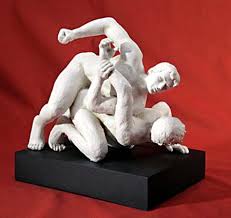Yep, Tim Philpot is still a racist bigot
Amongst
other things, Judge Philpot’s fictional autobiography (Judge Z) is a thinly
veiled racist diatribe. It’s instructive to compare it with his earlier work (Fords
Wonderful World of Golf) which describes his dysfunctional upbringing at the
hands of his Televangelist father Ford Philpot, and has an unmistakable pervading
theme of repressed homoeroticism. The golf-centric
book has relatively innocuous racist expressions such as the mocking of
ant-apartheid demonstrators who attempt to boycott South African golfers, and
even these are balanced by mollifications such as the comically bizarre claim
that the young Philpot’s parents abruptly yanked him from a boarding school on
catching wind of someone at the establishment uttering the “N” word.
In
his latest book, the kid gloves are off. The court cases described are rife
with patronizing stereotypes of minorities including promiscuous,
over-reproducing African Americans and drugged
out Mexican strippers. Black characters are generally depicted as angry,
feckless and “fatherless” murderers when they clash with the judge. Of the ten
or so divorcing couples described and derided, at least half include a man of
color who is demonized as a villain.
While
the book attempts to show a diverse community supporting its hero, token
minority characters remain as supporting cast, only portrayed positively if
they play the role of “Uncle Toms” by acquiescing through, conformist
activities such as:
1.
Parroting the judge’s ideology in law school seminars or court hearings (Nicole
Mason and her Reverend husband),
2.
Inviting him to preach at their Church (The congregation of Mt. Gilead
Missionary Baptist Church)
3.
Being cajoled by the judge to throw an impromptu birthday party for a boy named
for slaveholder Jefferson Davis, and son of a racist skinhead (Aaron Morris)
4.
Protecting him from physical assault in court (Deputy Clarence Palmer), or
5.
Being cured of delinquency by heeding his advice to eschew abortion (Ivory
Smith)
The
author’s courtroom attitude to black men is obvious through his description of
the several young African-Americans who murder each other through the course of
the book despite his “mentorship,” as well his alter ego’s observations:
"Judge
Z had seen them all in court. All the signs of a bad outcome were there. The
gang tats, the drooping pants hanging so low it looked like they had repealed
the law of gravity, the hoodies and white T-shirts, the gang signs they flashed
to each other. All were black. All were killed by other young black men. ...
Every year more young black men were murdered in Lexington. All by other black
kids. Not by cops. But the cops were always the targets of protests and
accusations about police brutality and excessive force."
His
attitude to other minorities is also only likely to have hardened even though he
now has to watch what he says publically as a judge:
"I hate to say this because I
will be accused at some point in my lifetime of probably making some sort of
racially derogatory statement, and this is not what I intended to do
whatsoever, Your Honor, but I do think there is a mind- set among the Oriental
people, and I've had lots of them as clients, they do not understand the
truth," Philpot said during closing
arguments of the divorce case in June 1993.
"I think they don't sit down
and think about what is the truth and what is the standard here of what is
right and wrong," Philpot
said.
"They say whatever they think is going to help them at the time."
Everyone
is entitled to his or her opinions, but the important point here is that Judge
Philpot is entrusted to dispense justice to all the people entering his
courtroom. In family court, the judge is for all practical purpose the final
word when interpreting facts and truth. Even if an appeal is successful, the
case just goes back to his court with new instructions because the appellate court
will assume that he is being fair even if they disagree on technical matters of
law. To change judges or have them
recused is almost impossible. For a judge to have such power and be so
obviously prejudiced is a cause of serious concern to the Kentucky families
that look to him for fairness.
Amazon review
Flirting with the KKK
Amazon review
Flirting with the KKK





Comments
Post a Comment